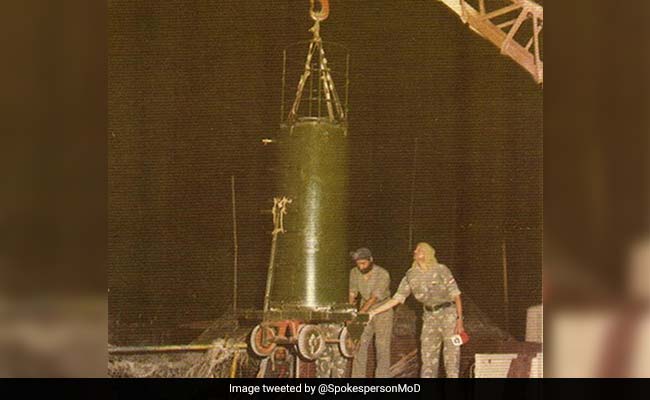
India's elections and atom bombs have an umbilical connect. The same facilities that make electronic voting machines (EVMs) also helped made the bombs in Pokhran.
India celebrates National Technology Day on May 11. On this day 26 years ago, the sands below the Thar desert shook, but did not leak radiation as India detonated three nuclear bombs in Pokhran on May 11, 1998.
Currently, India is in the throes of a general election with nearly a billion people eligible to cast their votes. It is not widely known that it is the same institutions that powered the nuclear explosions in 1974 and 1998, which today help empower the citizens of India, since all the EVMs are made in highly secure facilities of the same institutions that helped India become a nuclear weapons state.
India's elections today are the most secure and advanced, since the same departments who helped make India's atom bombs make the EVMs.
Nearly 5.5 million EVM's have been deployed for the 2024 general elections, the Election Commission (EC) has said in what is the world's single-largest democratic exercise. Each EVM can record up to 2,000 votes and up to 384 candidates can be accommodated in each EVM.
All the EVM's have been made at two highly secure facilities - the Electronic Corporation of India Limited (ECIL), a Hyderabad-based facility that comes under the Department of Atomic Energy, and Bharat Electronic Limited (BEL) in Bengaluru, an institution under the Defence Ministry. Both these facilities help make some of the most rugged and top secret hardware used by India's military.

The ECIL helps make much of the electronics that goes into making India's atomic power plants. It was deeply involved in fabricating the sophisticated and miniaturised electronics that went into India's fission and fusion bombs. ECIL also makes jam-proof and hacking secure communications devices for India's military, and so making EVMs the standalone calculator-like devices that are unconnected to any other device through Wi-Fi or Bluetooth is almost child's play for the scientists at ECIL.
BEL is India's top facility making the most advanced electronics that goes into India's missile systems, such as the intercontinental-range ballistic missile Agni-5, nuclear-powered submarines, Tejas fighter jets, spy satellites, rockets, and aircraft carriers On the side, BEL makes tamper- and hack-proof EVMs.
According to the EC, the lifespan of an EVM is 15 years and the control unit costs Rs 9,812; the balloting unit costs Rs 7,991 and the voter-verifiable paper audit trail (VVPAT) costs Rs 16,132. So the whole unit costs about Rs 33,935. The ECI spent Rs 3,960.10 crore between, 2021 and 2023 to buy the latest model called "M3 EVMs".
The EVMs are manufactured in secure assembly lines at BEL and ECIL, and all the movement is video recorded. The only component that is imported for the EVMs is the chip, which is sourced from European foundries and trusted sources. This import is still being done since India does not have a manufacturing facility for silicon chips. Once the India Semi-Conductor Mission takes off, even this import of chips may come to an end.
After 2019, the EC has deployed only the M3 EVMs, which are the most advanced and all the earlier models M1 and M2 have been discarded for good. According to EC, the M3 models have a unique and new self-diagnostic feature and if it is tampered with, the machine shuts down and becomes inoperable. Once it goes into this safety mode, only the original manufacturer can restore it, so experts who oversee EVMs say they are literally tamper-proof in the field.
Data from EC show that till date a total of about 340 crore votes have been cast on EVMs in India during the last four consecutive parliamentary elections, and in 132 different assembly elections. The EC says "no incident of EVM tampering has ever been found". "The EVMs just can't be hacked," Chief Election Commissioner Rajeev Kumar said. Even the Supreme Court has affirmed it.
Both BEL and ECIL are best in their class of institutions that make components used to secure India's borders. That they also help secure India's democracy and freedom is like a small side activity. For them, making atom bombs and missiles is bread and butter, and manufacturing EVMs is just the jam.
Track Latest News Live on NDTV.com and get news updates from India and around the world

